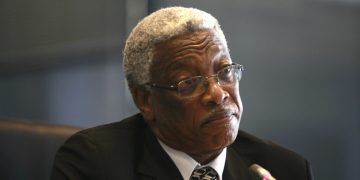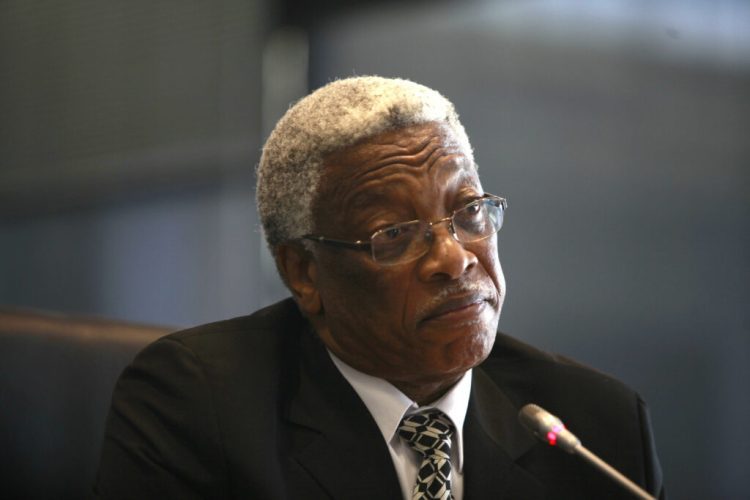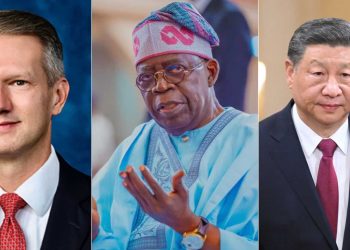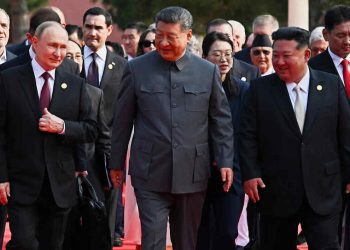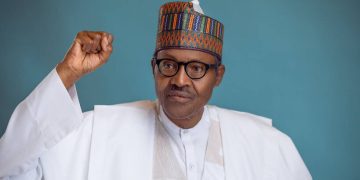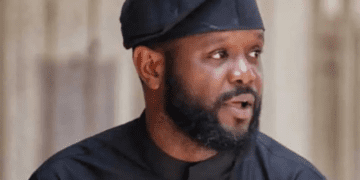The Mbenenge Tribunal probing allegations of s*xual harassment against Eastern Cape Judge President Selby Mbenenge has entered a critical phase, with key witness Ms. Thandeka Jobela back on the stand for cross-examination on May 9, 2025.
The Mbenenge tribunal, which resumed this week at the Capital Hotel in Sandton, has drawn significant attention as it marks the first time in South Africa’s history that a Judge President is testifying in response to such allegations.
The case, centered on claims by complainant Andiswa Mengo, a judge’s secretary in the Eastern Cape High Court, has raised profound questions about power dynamics, workplace misconduct, and the interpretation of digital communication in the judiciary.
Here’s a detailed look at the latest developments, the evidence presented, and the broader implications of this landmark Mbenenge tribunal.

The Allegations and the Mbenenge Tribunal’s Focus
The Mbenenge Tribunal, chaired by retired Judge Chris Ngoepe, is investigating accusations of gross misconduct against Judge President Selby Mbenenge.
The complainant, Andiswa Mengo, alleges that Mbenenge s*xually harassed her through inappropriate WhatsApp messages, including the use of emojis with s*xual connotations, such as bananas, peaches, eggplants, and dripping syringes.
Mengo, who works as a secretary in Mbenenge’s court, testified in January 2025 that she feared losing her job if she spoke out, highlighting the power imbalance between her and the Judge President.
The Mbenenge tribunal’s proceedings have been televised, offering the public a rare glimpse into the judicial accountability process.
Mengo’s testimony, described as “chilling” by Judges Matter, detailed her discomfort with Mbenenge’s messages and her subsequent distress.
She also claimed that after lodging her formal complaint, police seized her cellphone, and some messages were deleted upon its return, an allegation that has added complexity to the case.
This week, the Mbenenge tribunal has focused on cross-examining key witnesses, including Ms. Thandeka Jobela, who returned to the stand on May 9.
While specific details about Jobela’s testimony are limited in recent reports, her cross-examination follows intense scrutiny of Mengo’s claims and expert testimony about the emojis’ meanings.
The Mbenenge tribunal is expected to hear from Mbenenge’s witnesses, including his own emoji expert, as he vehemently denies the allegations.
Emoji Evidence: A Modern Twist in a Serious Case
One of the most striking elements of the Mbenenge tribunal has been the testimony of forensic linguist Dr. Zakeera Docrat, who took the stand on May 7, 2025.
Docrat analyzed Mbenenge’s WhatsApp messages and concluded that his use of banana, peach, eggplant, and dripping syringe emojis carried “s*xual connotations” and suggested an intent to pursue intimacy with Mengo.
Her evidence highlighted a pattern in the messages, contradicting Mbenenge’s claims of innocence and emphasizing the contextual significance of emojis in digital communication.
The inclusion of emoji evidence has sparked debate about how modern communication tools are interpreted in legal settings.
As Daily Maverick reported, the case raises broader questions about the evolving role of digital messages in workplace misconduct allegations.
Mbenenge’s defense is expected to counter with its own expert to challenge Docrat’s interpretations, underscoring the complexity of proving intent in such cases.
Cross-Examination and Defense Strategy at Mbenenge Tribunal
The cross-examination of witnesses, including Jobela and previously Mengo, has been a focal point of the Mbenenge tribunal.
Mengo faced rigorous questioning from Mbenenge’s legal team, led by Advocate Dali Mpofu SC, who sought to cast doubt on her credibility.
Mpofu questioned why Mengo lodged two complaints and suggested she was dishonest about the drafting of the second complaint.
These tactics reflect a defense strategy aimed at undermining the complainant’s narrative and highlighting inconsistencies in the evidence.
Jobela’s return to the stand on May 9 suggests she plays a significant role in either corroborating Mengo’s account or providing context to the events in question.
While coverage did not specify the content of her testimony, more revelations are expected this week, indicating that her cross-examination could shed new light on the case.
The Mbenenge tribunal’s schedule, running through May 16, 2025, includes testimony from Mbenenge’s witnesses, with the Judge President himself expected to take the stand, a historic moment for South Africa’s judiciary.
The Role of Power Dynamics
The Mbenenge case has brought renewed attention to the issue of power dynamics in workplace harassment.
Mengo’s testimony emphasized her fear of professional repercussions, a sentiment echoed by advocates like Brenda Madumise-Pajibo, who condemned the allegations against Mbenenge and another judge facing similar charges.
Judges Matter noted that perpetrators of s*xual harassment often occupy positions of authority, making it difficult for victims to come forward.
Mengo’s decision to lodge a complaint against a figure as senior as a Judge President is seen as a courageous step, but it also underscores the systemic barriers faced by complainants in such cases.
The Mbenenge tribunal’s handling of the case could set a precedent for how sexual harassment allegations are addressed within the judiciary, an institution traditionally viewed as a pillar of integrity.
The public nature of the proceedings, coupled with the involvement of high-profile legal figures, has amplified scrutiny of the Judicial Service Commission (JSC) and its processes for addressing misconduct.
Broader Context: A Judiciary Under Scrutiny
The Mbenenge tribunal is part of a broader reckoning within South Africa’s judiciary.
In January 2025, eNCA reported on another judge facing s*xual harassment allegations, prompting advocates to call for stronger accountability mechanisms.
The JSC’s Judicial Conduct Tribunal is tasked with upholding the judiciary’s ethical standards, but cases like Mbenenge’s highlight the challenges of investigating senior officials.
Former Chief Justice Raymond Zondo’s alleged misplacement of Mengo’s initial complaint, as reported by News24, has raised questions about the JSC’s administrative efficiency and its handling of sensitive cases.
The case also intersects with South Africa’s ongoing discussions about gender-based violence and workplace safety.
Recent news, reflects a society grappling with systemic issues of abuse and exploitation.
The Mbenenge tribunal, while focused on a specific allegation, resonates with these broader societal concerns, making its outcome all the more significant.
Implications of the Judicial Conduct Tribunal
As the Mbenenge tribunal continues, all eyes are on Mbenenge’s testimony and the defense’s response to the emoji evidence.
The outcome could have far-reaching implications for judicial accountability, workplace policies, and the interpretation of digital communication in legal contexts.
A finding of gross misconduct could lead to Mbenenge’s removal from office, a rare and serious consequence for a Judge President.
Conversely, a dismissal of the allegations would raise questions about the threshold for proving harassment and the protections afforded to complainants.
The Judicial Conduct tribunal is not expected to conclude by May 16, 2025, but the coming days will likely bring critical developments.
Mbenenge’s testimony, in particular, will be a defining moment, as he faces the unprecedented task of defending himself against allegations that have already tarnished his reputation.
For Mengo, the process has been a grueling test of resilience, with her credibility and motives scrutinized in a public forum.
Conclusion
The Judicial Conduct Tribunal for Judge President Selby Mbenenge is a watershed moment for South Africa’s judiciary, exposing the complexities of addressing s*xual harassment allegations at the highest levels.
With Ms. Thandeka Jobela’s cross-examination and Mbenenge’s upcoming testimony, the case is poised to deliver further revelations that could shape the future of judicial accountability.
Beyond the specifics of the allegations, the Mbenenge tribunal buttresses the need for robust systems to protect victims, challenge power imbalances, and ensure justice in all its forms.
As South Africans watch this historic case unfold, the hope is that it will pave the way for a more equitable and transparent judiciary, one that upholds the values it is meant to protect.
